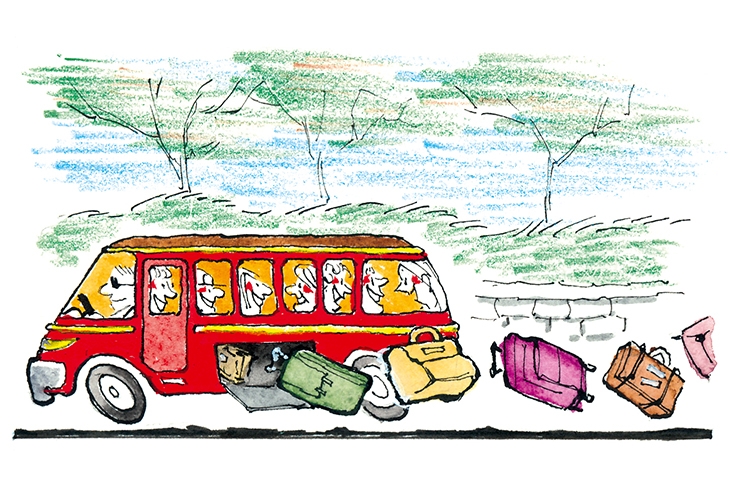The prep school I went to in the 1970s had changed little since the 1940s. Lumpy mattresses, barely edible food, harsh discipline. It’s why we spent our every day there dreaming of escape; and why we nicknamed it Colditz. Not that I’m complaining. Though no mother now would dream of sending her eight-year old boy to such an establishment, I feel quite privileged to have been there. It was horrible but it was endurable and it was very, very memorable. Experience with a capital ‘E’.
One thing you notice under such conditions is how incredibly appreciative you become of every creature comfort. On the rare occasions when they accidentally gave us butter instead of marge, it tasted better than ambrosia; as for the time when they couldn’t find any tracing paper for us to use as bog roll and had to substitute some soft tissue instead — well, it felt gentler than ermine and thistledown.
Heavenliest of all were school trips: the one occasion during term-time apart from exeats when we were permitted to enjoy the pleasures of the outside world. Obviously, you were still in your horrid uniform —scratchy flannel shorts, grey blazer with wasp-patterned trimming — and under military discipline. But it still felt pretty cushy.
I can’t remember exactly where the incident happened but it will definitely have been at one of the following places: Tintern Abbey; Goodrich Castle; Berkeley Castle; Slimbridge wildlife centre; Symond’s Yat; British Camp. That’s because the people in charge of our school trips were unimaginative but practical, always taking us, year in year out, to places within spitting distance of Malvern, which is where my prep school was, at the foot of what I used to call the Black Hills of Death. That’s how they looked to me, as they loomed ever closer, as Daddy drove my brother and me back to school after exeat.
Let’s say, for the sake of argument, that we’d been to Berkeley Castle. Then I can rehearse the anecdote in which a dozen or so cheeky 11-year-olds vie as to who will be first to pluck up the courage to ask the prim, matronly tour guide how Edward II actually died. Tragically for all of us she’d been asked many times before and wasn’t remotely fazed. ‘He was burnt internally,’ she replied.
But after the tour was over came the bit we’d all been waiting for. Not the bloody ruins or the mandarin ducks or any of that educational stuff, but the moment when, as a treat, Sir finally says: ‘OK, boys. I’ll give you 15 minutes — no more! — to buy yourselves some tuck.’
‘Tuck’ was what you called sweets in those days, just as tea was always ‘char’. And it really was a very precious thing. As important and uplifting and life-saving as when the Red Cross parcels finally arrive.
But on this occasion it was not to be. That’s because our coach driver had approached the master in charge of the expedition in a state of fury. Someone — a boy obviously — had slashed the back of the coach seats with a knife. This is another detail that dates the story. Today, it would be quite unusual for school kids to carry knives. But back then they were de rigueur. It would have been unthinkable not to have a penknife: indeed, the school authorities encouraged it on the Baden-Powell-ish principle of ‘Be Prepared’. Quite correctly, it was understood also that schoolboys who are trusted to carry knives repay that trust by using them responsibly.
That was why a ripple of absolute and total horror spread among us schoolboys at the news of this act of vandalism. It seemed so barbaric and unnecessary and, let’s be frank, oiky. That’s why we all had a pretty good idea who’d done it: an outsider kid I’m going to call ‘Smith’. He wasn’t hated; he was just a loner from an odd background who kept himself to himself. None of us owed him any loyalties. He was nobody’s best friend.
But when the master in charge did his thing — ‘We’re not going to go until someone owns up’ — no one spoke or even looked at the assumed culprit. We waited half an hour. Still no one said anything. We waited another half hour, with Sir growing puce-faced and threatening us with all manner of stuff, including a several weeks’ ban on tuck. None of us was ever going to break.
Looking back, the thing that puzzles me was why we were all so happy to suffer on behalf of a stupid boy who’d done a sly, ugly thing then shafted us all by refusing to own up. It was more than just a case of observing the rule about not sneaking. We genuinely bore our comrade no resentment, whereas we hated the teacher for administering that group punishment. But that’s the prison camp mentality I guess: guards on one side; POWs on the other — and ne’er the twain shall fraternise.







Comments